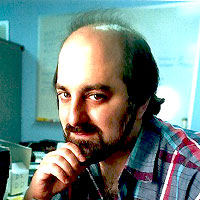Phil Katz facts for kids
Quick facts for kids
Phillip Walter Katz
|
|
|---|---|
 |
|
| Born | November 3, 1962 Milwaukee, Wisconsin, U.S.
|
| Died | April 14, 2000 (aged 37) Milwaukee, Wisconsin, U.S.
|
| Occupation | Computer programmer |
| Known for | Co-creator of Zip file format PKZIP |
Phillip Walter Katz (born November 3, 1962 – died April 14, 2000) was a talented computer programmer. He is famous for helping create the Zip file format. This format helps make computer files smaller, which is called data compression. Phil Katz also created a popular program called PKZIP. This program could create Zip files and was used on computers running DOS. His company, PKWARE, Inc., became very successful.
Contents
Early Life and Career
Phil Katz grew up in Glendale, Wisconsin. He went to Nicolet High School there. Later, he studied Computer Science Engineering at the University of Wisconsin–Milwaukee. After finishing college, he started working as a programmer at the Allen-Bradley company. At Allen-Bradley, he wrote special instructions, called code. This code helped run machines in factories around the world.
Creating PKARC and PKWARE
In 1986, Phil Katz left Allen-Bradley. He started working on a new program called PKARC. This program was an alternative to another popular file compression program called ARC. ARC was written in a language called C. But PKARC was partly written in assembly language. This made PKARC much faster than ARC.
Phil Katz was very good at making computer code work quickly. He would write C code in different ways. Then he would check which way made the fastest assembly code. He first shared only PKXARC, a program to extract (uncompress) files. It was given away for free, which is called freeware. Because it was so fast, it quickly became very popular. People on BBS (online message boards) loved it.
This positive feedback encouraged Katz to release his compression program, PKARC. He decided to make his software shareware. This means you can try it for free, but you should pay if you keep using it. In 1986, Katz started his own company, PKWARE, Inc.. He ran the company from his home in Glendale, Wisconsin.
The Rise of PKZIP
Phil Katz became one of the most famous shareware creators because of PKZIP. PKZIP was a new program that used different ways to compress files. It quickly became the main tool for making and opening Zip files. Even though PKWARE became a very successful company, Phil Katz was known more for his technical skills than for his business skills.
Lawsuit and Zip Format Success
In the late 1980s, there was a disagreement between System Enhancement Associates (SEA) and PKWARE. SEA made the ARC program. They sued Phil Katz for using their ideas. A computer expert looked at both programs. He found that PKARC seemed to be based on ARC. He even found the same spelling mistakes in the code of both programs.
In August 1988, both companies agreed to settle the lawsuit. PKWARE agreed to stop using the ARC name. They also agreed to stop making programs that worked with ARC files. After this, PKWARE focused on PKZIP and PKUNZIP. These programs used new and different ways to compress files.
This lawsuit became a big topic in the online BBS world. Many users supported Phil Katz. They saw SEA as a big company trying to stop a smaller creator. Phil Katz gained even more support when he shared the details of the Zip file format. He made sure that the Zip format would always be free for anyone to use. This meant other software companies could create their own Zip programs. Because of this, the Zip format quickly became the most popular way to compress files. It replaced the ARC format as the standard for sharing files online.
Images for kids
See also
 In Spanish: Phil Katz para niños
In Spanish: Phil Katz para niños


